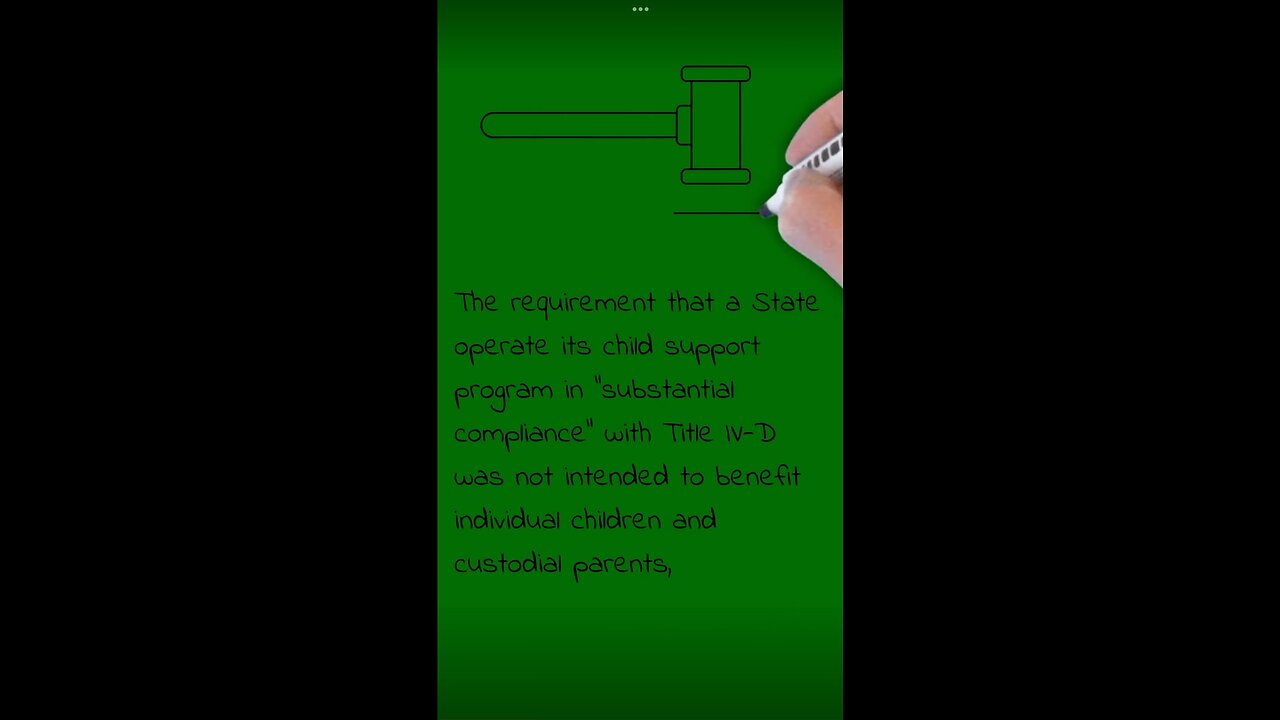Premium Only Content

Child support!
#Knowledgemakesmenunfit2beAslave
Child Support:
A payment that a noncustodial parent makes as a contribution to the costs of raising her or his child.
In the mid-1990s, as never before, child support became a topic of urgent U.S. national discussion. The system that awards and enforces child support was declared inadequate by state and federal policy makers. Failures in the system were blamed for child poverty rates, long-term dependence on government assistance, and the "feminization of poverty." Courts drew criticism for awarding child support inconsistently and inequitably. These social and economic issues attracted both federal attention and reform efforts.
The need for child support payments usually arises when one parent does not have physical custody of his or her child, so that parent's income does not benefit the child on a daily basis. At times, neither parent has custody, and both may pay a third person who is caring for the child. When both of a child's parents have full custody (as when they are married to each other), and usually when they are divorced and share joint physical custody, the needs of the child are presumed met and child support is not an issue. As long as parents provide a safe level of care, the government does not control their contributions to their children.
In the United States in the early 2000s, nearly half of all marriages ended in Divorce, and almost one-quarter of all children were born to unmarried parents. Most of the children who lived in single-parent families had a legal right to a child support order. Child support can be voluntary or court ordered and can be secured through a divorce decree or a separate action. Increasingly, support orders are issued by state agencies.
The legal duty to support a minor child belongs to both parents, even if the custodial parent is capable of caring for the child single-handedly. Support is awarded to provide for the child's basic needs and to allow the child to share in the standard of living of both parents. Although both mothers and fathers can be ordered to pay support, a 1994 study in Utah found that over a 20-year period, mothers were required to pay child support in fewer than one in five cases in which fathers received sole custody. A greater proportion of noncustodial fathers were ordered to pay support.
A petition for support is usually begun in a state court where the plaintiff (the parent seeking the order) resides. The Uniform Interstate Family Support Act of 1992, which was updated in 1996 and 2001 and which has been adopted in some form in the majority of states, provides that jurisdiction exists where the child or one of the parents resides. Before support can be awarded, parentage (called Paternity in the case of fathers, maternity in the case of mothers) must be demonstrated. The would-be payer is entitled to blood tests, but in some states must pay for them. The 1993 Federal Budget bill (Omnibus Budget Reconciliation Act of 1993, 42 U.S.C.A. § 666[a][2]) required states to offer speedy means of establishing parentage, since parentage disputes can delay a valid child support award.
Determining Awards
Child support awards are made by each state's family court system. Most states require that they be based on the best interests of the child. In addition to determining support in contentious divorce cases, courts review stipulations (agreements) between parents and can overrule an agreement that does not adequately provide for children.
Often, courts feel pressure to balance children's needs with their parents' needs. Awards are based on the noncustodial parent's ability to pay and must allow the parent to remain self-supporting. Many associations of noncustodial parents emerged after the 1980s to express their belief that awards were burdensome to the payers, benefited only the custodial parent, or did not provide payers with enough in return. At the same time, more single parents with children slipped into poverty than had at any other point in the nation's history.
In the mid-1990s, no federal child support guideline existed, mainly because child support was historically a state-controlled issue. Most states had established their own guidelines in the quest for fair standards. About 15 states used the "percentage-of-income" guideline, which is based on the income of the noncustodial parent.
Thirty states used the "income-shares" method, which is based on the income of both parents. It prorates the total support between the parents and calculates each contribution proportionally according to income. Several states used the elaborate Melson formula, which provides a basic subsistence level for each parent before determining the primary support needs of the children. This formula then awards a percentage of the remaining income so that the children share in the standard of living of each parent.
Even when guidelines are used, judges consider the facts of a case and other statutes. They can depart from the guidelines for considerations such as how property is divided, whether an arrearage (unpaid child support) exists, and what disparities in parents' incomes exist. In many states, judges must prove in writing that an exception to the guidelines serves the child's best interest.
In practice, courts are allowed to use many criteria in setting an award amount. Some judges consider the needs of subsequent children when obligors (payers) remarry and start new families. Some may adhere to the Uniform Parentage Act, which states that courts must take into consideration, among other things, the age of the child, the financial resources and earning ability of the child, and the value of services contributed by the custodial parent. Investment income, unearned income, over-time, bonuses, income from a second job, gifts, and retirement pay may all be eligible income when calculating child support due, regardless of its tax status. Putative income (earning capacity) is used to calculate support in many states if it is suspected that the noncustodial parent is deliberately underemployed or unemployed. The court is allowed to credit Social Security benefits toward support, but this action is not automatic. Child support is not deductible from either parent's taxes, any more than are the provisions that married parents supply to their children. The children themselves qualify as household deductions, but only one parent may claim them.
Unless a state mandates that child support be awarded, the court can deny it. Courts have denied support in situations of split custody, in which each parent has custody of one or more children. With exceptions, the court usually does not award child support to a noncustodial parent during visitation. Support can be ordered for legally adopted children. It cannot be ordered for grandchildren who have not been legally adopted.
Consequences for Nonpayment
The consequences of not paying child support are inconsistently applied—a situation many states want to remedy. A delinquent obligor may face contempt-of-court charges and civil penalties. Criminal sanctions can include a jail sentence or a fine, but these punishments are used sparingly and for repeat violations. Prosecution may proceed on a misdemeanor or felony level, depending on the circumstances. In addition, federal prosecution may occur for a parent who crosses a state line to avoid paying support.
Enforcement
In 1992 $27 billion in child support went uncollected. The U.S. department of health and human services has estimated that a substantial increase in child support collections could reduce the payments of Aid to Families with Dependent Children (AFDC) by 25 percent. The federal government created the AFDC program in 1935 to enable states to provide money and services to help poor children remain in their own, single-parent homes.
These observations were not lost on the 1994 Senate, which directed the Justice Department to "immediately address shortcomings in enforcement of the law [regarding child support]." Enforcement efforts are administered federally through the department's Office of Child Support Enforcement, but child support recovery units at the state level perform the daily task of securing payment.
The problems surrounding the collection of child support have provoked frustration and ingenuity in states throughout the nation. A major barrier to timely and regular collection is the large volume of child support orders that states are required to enforce monthly. One response has been to divert cases from the court system by empowering state agencies to enforce child support orders.
A primary means of collecting is wage withholding. This action requires that the employer of the obligor send a percentage of the obligor's paychecks to the state or county, which forwards it to the custodial parent. Where the custodial parent receives federal public assistance, income withholding is mandatory. Garnishment is similar to withholding, but it is used when the obligor is about to receive a lump-sum payment.
Interception of the obligor's federal tax return is another enforcement tool. In the first seven years after implementing a pilot of this requirement, $1.8 billion was collected. As of the early 2000s federal law requires every state to have legislation for intercepting the tax returns of delinquent obligors and applying them to child support after a review.
In October 1994, the U.S. Congress's Full Faith and Credit for Child Support Orders Act became effective (28 U.S.C.A. §§ 1 note, 1738B, 1738B note), enabling states to enforce and modify orders under certain circumstances.
-
 2:06:16
2:06:16
TheSaltyCracker
5 hours agoMedia Justifies Attack on National Guard ReeEEStream 11-26-25
90.9K242 -
 3:54:35
3:54:35
Mally_Mouse
8 hours ago🎮 Let's Play!!: Stardew Valley pt. 34
41.1K2 -
 18:25
18:25
MetatronHistory
2 days agoThe REAL Origins of the Macedonians
29.9K3 -
 1:22:12
1:22:12
MattMorseTV
5 hours ago $147.65 earned🔴It’s MUCH WORSE than WE THOUGHT. 🔴
129K183 -
 7:22:09
7:22:09
Meisters of Madness
9 hours agoOmega Gaiden - Part 4
26.4K1 -
 2:51:18
2:51:18
Barry Cunningham
8 hours agoBREAKING NEWS: NATIONAL GUARD ATTACK PRESS CONFERENCE AND LIVE UPDATES!
76.3K51 -
 LIVE
LIVE
SilverFox
5 hours ago🔴LIVE - ARC AT NIGHT! COME THRU!
366 watching -
 2:46:09
2:46:09
Joker Effect
4 hours agoCLAVICULAR - What the hell is "Looks Maxing"? Asmond Gold is a Demon. KaceyTron. Steve Will do it.
32.7K3 -
 3:31:22
3:31:22
SlingerGames
4 hours agoLIVE - Wumble Wednesday - BIRTHDAY STREAM!
12.6K1 -
 LIVE
LIVE
StevieTLIVE
5 hours agoWarzone Win Streaking BIG Challenges MASSIVE Hype NO Losses LOCK IN
71 watching